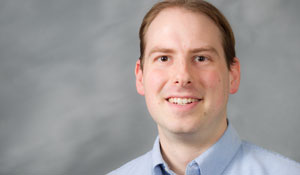Rouse awarded NSF grant to fund summer research program
 Assistant professor of mathematics Jeremy Rouse has been awarded a National Science Foundation grant in the amount of $258,354 to begin a summer research program for undergraduates interested in number theory research.
Assistant professor of mathematics Jeremy Rouse has been awarded a National Science Foundation grant in the amount of $258,354 to begin a summer research program for undergraduates interested in number theory research.
The program will be operated in conjunction with Davidson College. Rouse, who has a particular interest in elliptic curves and modular forms, will run the program with Katherine Thompson, a visiting assistant professor of mathematics at Davidson whose research interest is in quadratic forms.
The program is titled WADE INTO Research – Wake/Davidson Experience in Number Theory Research – and will give undergraduate participants the opportunity to conduct original mathematical research.
“It’s exciting to make a genuinely new contribution to a discipline, especially one as beautiful as mathematics,” Rouse said. “Our hope is that students will get excited about doing math and want to go to graduate school to study mathematics.
Number theory research is about finding and proving new theorems about numbers and their relationships with each other.
NSF funding supports the program for a total of three years, and WADE INTO Research will launch this summer on the Wake Forest campus for nine weeks, June through August. Applications are being accepted through Feb. 18 and eight undergraduate students will be chosen, one each from Wake Forest and Davidson.
The program is designed for students to experience the “excitement, joy and challenges of original mathematical research,” said Rouse. During the first two weeks, students will hear lectures from Rouse and Thompson about number theory background and work through exercises to master this background and then select research problems to pursue for the remaining seven weeks.
Students will also write at least one research paper and will prepare a conference talk to be presented at the University of Georgia’s Mock AMS conference, as well as posters to be presented at the Joint Math Meetings.
“Throughout, the students will benefit from a rich professional development program designed to assist them in developing their identity as mathematicians and discerning their future career trajectories,” Rouse said. “Participating in this research experience will give these students skills that will be very useful later in life, whether they choose to go into mathematics or not.”
Categories: University Announcements
